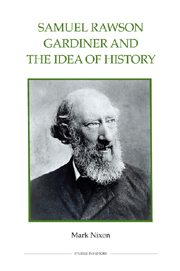Summary
If Gardiner's historical practice is to be understood, an attempt to divine his historical theory is essential. However, Gardiner's ideas about history have rarely been mentioned as historians and students of historiography have chosen rather to focus on his political and religious life. In part, this neglect has been occasioned by – or, perhaps, has caused – the concentration on Gardiner's magnum opus, the eighteen-volume History. In this work, the historian did not explicitly discuss any grand theory of history or, indeed, any other writer's theories regarding the study of the past. However, in his private correspondence, and his reviews of historical works, Gardiner did refer to larger issues of theory and method, and to certain theorists and other writers whose ideas had influenced historical practice in general, and Gardiner's practice in particular. Using these less well-studied sources, this chapter will seek to construct a hypothesis regarding his own theoretical position which can be tested in subsequent chapters focusing on his practice.
The shortcomings of the contextualist methodology may be illustrated by considering the problems involved in using Gardiner's life to ‘tell’ his work. In his The Victorians and the Stuart heritage, the most extensive published study of Gardiner and his work of recent years, Timothy Lang sees the work of Gardiner entirely through the prism of the historian's early Irvingism, later anglicanism and lifelong Liberalism. Lang tells his readers that Gardiner joined the Catholic Apostolic Church (the Irvingites) in 1851, was ordained a deacon in 1854 and married one of Irving's daughters in 1856.
- Type
- Chapter
- Information
- Samuel Rawson Gardiner and the Idea of History , pp. 23 - 46Publisher: Boydell & BrewerPrint publication year: 2011



